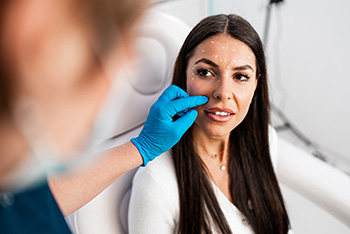Medical vs. Cosmetic Dermatology: What’s the Difference?

Dermatology can help patients with medical and cosmetic needs. It’s important to understand the difference between medical and cosmetic dermatology, since each has its own specific focus.
What Is Medical Dermatology?
Medical dermatology involves diagnosing and treating medical skin conditions. These conditions range from a simple case of eczema to something severe like skin cancer. They are often problems that impact your overall health if left untreated. Given how the skin is the body’s largest organ, conditions and treatments vary.
In medical dermatology, the job of a board-certified dermatologist is to treat patients by recommending lifestyle changes, prescribing medications, and conducting medical procedures. These treatments are used to ease the symptoms of medical skin conditions, avoid their triggers, and prevent them from occurring again.
Medical dermatology usually covers conditions such as the following:
- Acne
- Eczema
- Basal cell carcinoma
- Psoriasis
- Hives
- Warts
- Rosacea
- Actinic keratosis
- Hair loss
- Atopic dermatitis
- Molluscum contagiosum
- Incision and drainage of abscesses
- Seborrheic keratosis
What Is Cosmetic Dermatology?
Cosmetic dermatology procedures address skin problems that only affect your appearance. These include treatments to smooth wrinkles, tighten sagging skin, improve texture, and correct skin tone. Cosmetic dermatology is preferred by patients who want to reverse the signs of aging and appear more youthful and vibrant.
The main reason for getting cosmetic dermatology procedures in Boston is to address superficial skin problems. They satisfy a want, not a need, so insurance policies usually do not cover these procedures.
The following are examples of cosmetic dermatology treatment options:
- Wrinkle reducers
- Vein therapy
- Chemical peels
- Laser therapy
- Dermal fillers
- CoolSculpting
- Laser hair removal
You can get dermal fillers in Boston to treat moderate and harsh lines and hollow depressions by adding volume to your skin. Chemical peels address issues like hyperpigmentation, acne, and poor skin texture and tone. Laser therapy includes laser hair reduction and vascular and pigmented lesion removal.
Medical Dermatology vs. Cosmetic Dermatology
Medical and cosmetic dermatology differ in terms of goals. Medical dermatology aims to cure your skin problems to improve your skin and overall health. On the other hand, the goal of cosmetic dermatology is to provide you with younger-looking, healthier, and smoother skin. During the consultation, you should tell your doctor what your goals are.
While cosmetic and medical dermatology differ in their focus on addressing skin problems, they are closely associated. A good example would be how a dermal filler (a cosmetic treatment) can restore facial volume in areas with depleted skin due to skin cancer treatment, which falls under medical dermatology.
Book an Appointment
Are you wondering which dermatology treatments you’ll need to address your skin concerns? Learn more about whether these solutions fall under medical or cosmetic dermatology—contact Westford Dermatology & Cosmetic Center today to schedule your appointment.

